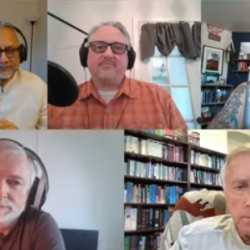Thus, all polarities in relative understanding exist in perfect balance. The male cannot exist without the female and the "good" cannot exist without the "evil."
This concept is perfectly represented in the Yin/Yang symbol of the Tao: both polarities are constantly mutating into their opposites.
According to Hindus, a person's karma (action) is predetermined based upon his or her past karma. This is not fatalism or predestination; it is just the understanding that past karma influences who and what we are. If one becomes enlightened, then by definition one has already canceled one's past karma. Some Hindu philosophical systems argue that to act at all in the world once one is enlightened is counter-productive—it will only create new karma.
According to Taoism, Tao is simply what it is: a harmony of opposites which are always in a state of flux. Taoists have the philosophy of wu wei, which is best translated as "leaving things alone." To tamper with the way-things-are is to upset perfect balance; therefore Tao is disturbed. In an effort to change what is, say the Taoists, one can make things worse. To be in harmony with Tao is to make no effort, for effort upsets the perfect balance of Yin/Yang.
The rigid tree snaps in strong winds, while bamboo bends and thus survives. The continual resistance against negative things that come into our lives eventually becomes debilitating. Resistance is futile, and it can even drive us crazy. The ancient Taoist sages would tell us that we can only be happy in life if we accept, and not judge, that which changes—since change is inevitable.
Chuang Tzu, or Zhangzi, one of Taoism's greatest philosophers, was both a skeptic and a relativist, and the following short stories exemplify both:
Chuang Tzu and Huizi were walking by a dam when Chuang Tzu said, "See how the little fish are enjoying themselves, darting this way and that without a care."
Huizi replied, "How do you know the fish are enjoying themselves? You're not a fish."
Chuang Tzu countered with, "How do you know I don't know? You're not me!"
Once Chuang Tzu dreamt that he was a butterfly flitting around, happy with himself, doing what he pleased. When Chuang Tzu suddenly woke up, he didn't know whether he was Chuang Tzu dreaming that he was a butterfly, or a butterfly dreaming that he was Chuang Tzu.
The philosophy of Wu Wei teaches that we should act without acting. When someone exerts his will against the world, he disrupts the primordial harmony. Wu Wei is not so much non-action as it is acting in harmony with the natural order of things.
Another related concept of Taoism is P'u, which encourages one to keep oneself in the primordial state of Tao. This is thought to be the true nature of the mind, unburdened by knowledge and experiences. In the state of P'u, there is no right or wrong, beautiful or ugly. There is only pure experience, or awareness, free from intellectual labels and definitions—pure potential, and perception without prejudice. In this state, everything can be seen as it truly is, without preconceptions or illusion. In this, Buddhists, Hindus, Sufi, and Christian mystics are all in agreement.
Ramana Maharshi once said, "There is nothing wrong with God's creation. Misery and suffering only exist in the mind." Uppaluri Gopala Krishnamurti expressed this same understanding less tactfully:
You want a different world so that you can be happy in it... Since you are determined to bring about change—a notion put into you by your culture—you remain discontent and want the world to be different. When your inner demand to be something different than what in fact you are comes to an end, the neurotic demand to change your society ceases. Then you cannot be in conflict with society; you are in perfect harmony with society, including its brutalities and miseries. All your attempts to change this brutal society only adds momentum to it. (From: Mind Is a Myth—Disquieting Conversations with a Man Called U.G.).
Copyright © 2013 The Essential Mystics, Poets, Saints, and Sages by Richard Hooper. Reprinted with permission from Hampton Roads Publishing. Available wherever books or ebooks are sold or from www.redwheelweiser.com or 1-800-423-7087.
:::page break:::



